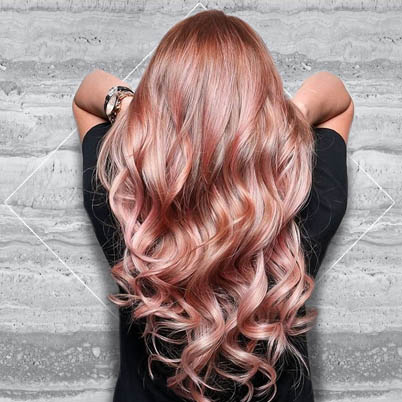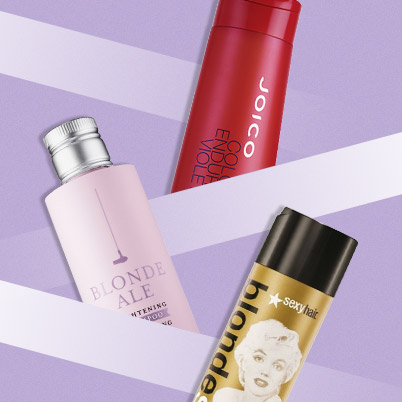If you live in a hot or humid climate, or live to exercise, our experts give you permission to shampoo daily. "Hot, humid climates will make people sweat and produce more oil, so the scalp may need more frequent cleansing," says Tanzi. Same for those who work out, she advises.
"Hair should also always be shampooed after exercising," Kingsley says. "As we sweat, more oil and bacteria can build up on the scalp."
Letting oil and sweat linger between shampoos can cause side effects like irritation, bacteria growth and foul odors -- and worse, according to Blaisure. "I have seen many people with hair loss who do not shampoo often," she says. "Oil and bacteria buildup can cause scalp problems, which can lead to inflammation in the skin, which then becomes a factor for those who experience hair loss."
People who live in cold climates (or amid constant A/C) and don't sweat on the regular can shampoo less frequently. "These individuals tend to shampoo less, but that is not always necessary," Fusco says. "A shampoo which is hydrating and nourishing" is fine for every day. Try: Briogeo Blossom & Bloom Ginseng + Biotin Volumizing Shampoo, $24.
Image via Getty
"Hair should also always be shampooed after exercising," Kingsley says. "As we sweat, more oil and bacteria can build up on the scalp."
Letting oil and sweat linger between shampoos can cause side effects like irritation, bacteria growth and foul odors -- and worse, according to Blaisure. "I have seen many people with hair loss who do not shampoo often," she says. "Oil and bacteria buildup can cause scalp problems, which can lead to inflammation in the skin, which then becomes a factor for those who experience hair loss."
People who live in cold climates (or amid constant A/C) and don't sweat on the regular can shampoo less frequently. "These individuals tend to shampoo less, but that is not always necessary," Fusco says. "A shampoo which is hydrating and nourishing" is fine for every day. Try: Briogeo Blossom & Bloom Ginseng + Biotin Volumizing Shampoo, $24.
Image via Getty
Our experts agree that it's fine to wash hair daily if you're using shampoos with gentle ingredients. "For frequent shampooers, try to avoid sulfates," says Tanzi. Sulfates are added to shampoos to reduce sebum and build lather, but they are also known to cause dryness and irritation.
"Sulfate-free shampoos are usually the gentlest, especially for color treated hair," agrees Cristina B, stylist at Rita Hazan Salon. "Rita Hazan True Color Shampoo, $26, is great."
Fusco recommends buying products with botanically based moisturizing ingredients. "Soybean oil, coconut and shea butter are some of the most nourishing ingredients out there," she says.
Surprisingly, Blaisure is "not a fan" of cleansing conditioners, which are typically marketed as gentle cleansers. "Many of these products are not really cleaning the skin, but instead are leaving a lot of bacteria residue on the scalp, which can lead to build-up of products and oil and leave the scalp vulnerable to inflammation," she says. Blaisure suggests a sulfate-free, pH-balanced shampoo like Bosley Professional Strength BosDefense Nourishing Shampoo, $15.99.
Image via Getty
"Sulfate-free shampoos are usually the gentlest, especially for color treated hair," agrees Cristina B, stylist at Rita Hazan Salon. "Rita Hazan True Color Shampoo, $26, is great."
Fusco recommends buying products with botanically based moisturizing ingredients. "Soybean oil, coconut and shea butter are some of the most nourishing ingredients out there," she says.
Surprisingly, Blaisure is "not a fan" of cleansing conditioners, which are typically marketed as gentle cleansers. "Many of these products are not really cleaning the skin, but instead are leaving a lot of bacteria residue on the scalp, which can lead to build-up of products and oil and leave the scalp vulnerable to inflammation," she says. Blaisure suggests a sulfate-free, pH-balanced shampoo like Bosley Professional Strength BosDefense Nourishing Shampoo, $15.99.
Image via Getty
Love hair products? Then you also better love shampooing. "Individuals who use a lot of product -- hair spray, gels, et cetera -- may require more frequent shampooing," Fusco confirms. Product build-up can make hair look dull and can irritate the scalp with prolonged exposure, just like oil does.
And if you haven't given much thought to scalp condition, you should, according to Blaisure. "Researchers and scientists who study hair and scalp are realizing the importance of a balanced scalp and how it relates to hair and scalp health," says Blaisure. A healthy scalp produces soft, manageable hair that grows quickly; an unhealthy scalp can lead to unruly hair texture, sluggish hair growth and the aforementioned hair loss.
(For more proof that an out-of-whack scalp could be causing lackluster locks, read The Real Reason You're Having a Bad Hair Day.)
Image via Getty
And if you haven't given much thought to scalp condition, you should, according to Blaisure. "Researchers and scientists who study hair and scalp are realizing the importance of a balanced scalp and how it relates to hair and scalp health," says Blaisure. A healthy scalp produces soft, manageable hair that grows quickly; an unhealthy scalp can lead to unruly hair texture, sluggish hair growth and the aforementioned hair loss.
(For more proof that an out-of-whack scalp could be causing lackluster locks, read The Real Reason You're Having a Bad Hair Day.)
Image via Getty
When deciding how often to shampoo, "it is important to consider how damaged your hair is," says Cristina B. Although hair naturally contains a small amount of water, completely saturating your hair in water weighs it down and stretches the fibers. Healthy hair is capable of handling this stress without breaking, but hair that's been over-processed (from bleaching or coloring) is more likely to snap in these conditions, particularly when handled or brushed. So, minimizing the time treated hair is wet -- like when you're shampooing -- can prevent breakage.
Not to mention shampooing can dull the color you've worked so hard to achieve, Blaisure says. "Water and shampoo can fade your hair color the more often you shampoo, especially the reds and delicate shades of blonde that are currently so popular."
Consider the damage caused by your styling routine, too; if you heat-treat or perm your hair, you should wash a few times a week with a product made for your hair type, like Bumble and Bumble Mending Shampoo, $31.
Dry shampoo can help absorb oil on your off-days, but don't treat it as a stand-in for shampoo and water. Build-up from dry shampoo can inflame the scalp and possibly lead to hair loss.
Image via Getty
Not to mention shampooing can dull the color you've worked so hard to achieve, Blaisure says. "Water and shampoo can fade your hair color the more often you shampoo, especially the reds and delicate shades of blonde that are currently so popular."
Consider the damage caused by your styling routine, too; if you heat-treat or perm your hair, you should wash a few times a week with a product made for your hair type, like Bumble and Bumble Mending Shampoo, $31.
Dry shampoo can help absorb oil on your off-days, but don't treat it as a stand-in for shampoo and water. Build-up from dry shampoo can inflame the scalp and possibly lead to hair loss.
Image via Getty
If you stockpile blotting papers and face powder, then you might also need to shampoo every day. You should also avoid a low-poo regimen. Women with normal or dry skin, however, can skip washing for a day or two.
Fusco says the biggest problem with oily hair is the most practical one: It smells. In addition to causing odors, an oily scalp undermines hair's health and strength.
"Oily hair is not ideal," Kingsley says. "If left to set on the scalp, oils can start to smell and can irritate the skin... And a healthy, clean scalp is vital to healthy hair growth."
Some dry shampoos, like Living Proof Perfect Hair Day Dry Shampoo, are specifically formulated to bind to oil, sweat and odors so they can be brushed out of hair. Although they can't rid your hair of dirt or styling products, these dry shampoos are OK to uses a couple times a week on days you don't lather up.
(Got a dry shampoo habit you can't quit? Read on to find out why you should exfoliate your scalp.)
Image via Getty
Fusco says the biggest problem with oily hair is the most practical one: It smells. In addition to causing odors, an oily scalp undermines hair's health and strength.
"Oily hair is not ideal," Kingsley says. "If left to set on the scalp, oils can start to smell and can irritate the skin... And a healthy, clean scalp is vital to healthy hair growth."
Some dry shampoos, like Living Proof Perfect Hair Day Dry Shampoo, are specifically formulated to bind to oil, sweat and odors so they can be brushed out of hair. Although they can't rid your hair of dirt or styling products, these dry shampoos are OK to uses a couple times a week on days you don't lather up.
(Got a dry shampoo habit you can't quit? Read on to find out why you should exfoliate your scalp.)
Image via Getty





